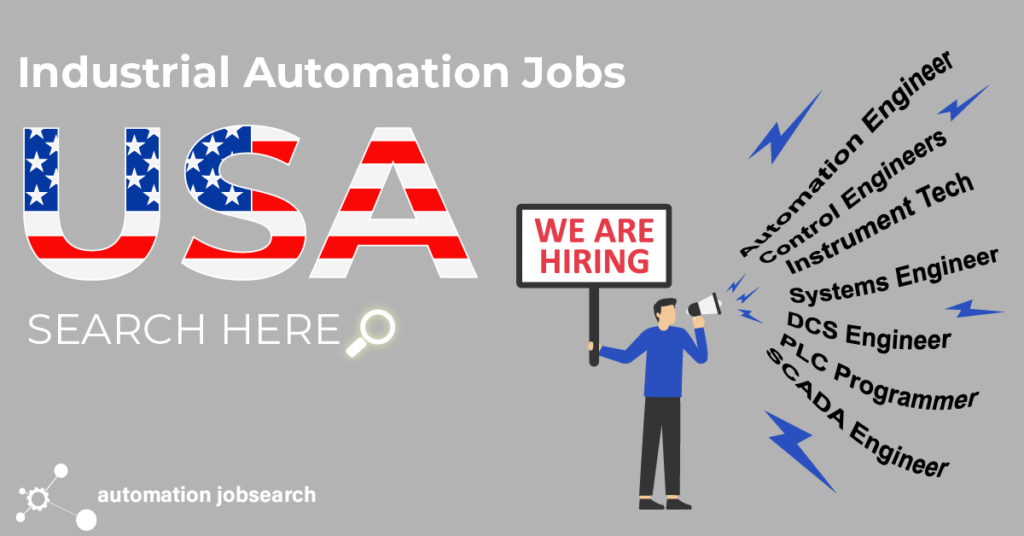Industrial Automation Jobs in the USA

The industrial automation sector in the USA is growing rapidly, generating many job opportunities as industries seek enhanced efficiency and innovation.
Market projections indicate an increase from USD 14.65 billion in 2024 to USD 24.16 billion by 2029—an impressive annual growth rate of 10.54%, indicating an all-time high demand for skilled professionals.
Key sectors such as manufacturing, energy, and pharmaceuticals are heavily investing in automation systems, highlighting the essential roles of system integrators and OEMs. This trend has led to a high demand for automation engineers and technicians.
What Roles Are Available in Industrial Automation in the USA?
The field of industrial automation in the USA encompasses a wide range of positions with different focus:
- SCADA Engineers
- PLC Programmers
- Control Systems Engineers
- Controls Engineers
- Robotics & Motion Control Engineers
- Instrumentation and Electrical (E&I) Technicians
- Instrumentation and Control (I&C) Technicians
- Industrial Networking Specialists
- DCS Engineers
- ICS Cyber Security
- Sales Engineers
SCADA Engineers
SCADA engineers are responsible for the design, implementation, and management of automation systems that monitor and control industrial processes across various sectors, including manufacturing, energy, and water management. Roles in this area may specialize in SCADA product development, configuration, and network design.
Key Skills: Familiarity with SCADA platforms (such as InTouch, Ignition, iFix and VTSCADA), network protocols (Modbus, OPC), database management, HMI (Human-Machine Interface) development, and system integration.
PLC Programmers
PLC Programmers create specialized industrial software for controlling automated machinery and processes within manufacturing environments. They utilize the IEC61131-3 programming languages, including FBD, LAD, and SFC, and commonly work with platforms like Siemens and Allen Bradley using tools like TIA Portal or RSLogix.
Key Skills: Development of IEC61131-3 application logic and troubleshooting experience with major PLC models such as Allen Bradley, Siemens, and Mitsubishi.
Control Systems Engineers / Automation Engineers
Control Systems Engineers are involved in the design and commissioning of automation systems such as SCADA and DCS. Automation Systems Engineers typically have a wide breadth of responsibilities, overseeing all aspects of application logic, hardware, network infrastructure, field instruments, and control panels.
They are also skilled at developing middleware solutions to integrate disparate automation technologies and systems with an industrial facility.
Key Skills: Instrumentation design, control system design, process automation, and knowledge of standards such as IEC and ISO for instrumentation and safety.
Controls Engineers
Controls Engineers focus on optimizing industrial automation systems by fine-tuning control loops and enhancing system designs based on process dynamics. Their work aims to improve metrics like quality, production efficiency, and safety.
Key Skills: Control theory, alarm management, simulation and modelling, and advanced process control (APC).
Robotics & Motion Control Engineers
Robotics Engineers design and develop robotic systems utilized in manufacturing, such as in automotive assembly and packaging. Their responsibilities include programming PLCs and servo controllers for robots performing tasks like welding and material handling.
Key Skills: Robotics programming, motion control, familiarity with industrial robot brands (e.g., ABB, Fanuc, KUKA), and integration of robots into broader automation systems.
Instrumentation and Electrical Technicians (E&I)
E&I Technicians are tasked with supporting the commissioning and maintenance of electrical and instrumentation components within an automation system. They ensure these components function correctly and integrate seamlessly with control systems, often performing electrical isolations for maintenance work.
Key Skills: Knowledge of drives and motors, electrical isolations, instrumentation, and safety standards in electrical installations.
Instrumentation and Control Technicians (I&C)
I&C Technicians maintain and commission instrument and control systems, validating the function of field instrumentation. They perform testing of instruments, packages, and other equipment managed by automation systems like PLCs and SCADA.
Key Skills: Calibration, commissioning, Ex inspection, and a foundational understanding of control systems for troubleshooting and communication.
Industrial Networking Specialists
Industrial Networking Specialists oversee the communication networks that support communication in automation systems.
They design, install, and maintain networks that connect control systems, PLCs, SCADA systems, and field devices.
Their role has evolved due to the increasing complexity of automation technologies and the convergence of IT and OT networks.
Key Skills: Proficiency in industrial communication protocols (Modbus, Ethernet/IP, PROFIBUS), cybersecurity, network architecture design, and diagnostics.
DCS Engineers
DCS Engineers are responsible for designing, configuring, and maintaining Distributed Control Systems (DCS), which are prevalent in process industries. This role often involves working with IEC 61131-3 languages and managing networks, servers, operating stations, and databases.
Key Skills: DCS architecture, process control strategies, system integration, troubleshooting, and expertise in industrial networks. Familiarity with leading DCS solutions such as Honeywell Experion, Emerson DeltaV, and ABB 800xA is essential.
ICS Cyber Security
Cybersecurity for Industrial Control Systems (ICS) is a critical discipline in the USA due to rising cyber threats. ICS Cybersecurity Specialists ensure robust security by integrating best practices into network designs.
Key Skills: Expertise in ICS network security design, firewall and DMZ implementation, vulnerability management, and penetration testing.
What Industries are Hiring Industrial Automation Professionals in the USA
The following sectors are actively recruiting industrial automation talent in the United States:
- Manufacturing
- Automotive
- Pharmaceuticals
- Food and Beverage
- Energy and Utilities
- Aerospace
Who Are the Key Employers in USA Industrial Automation?
Major employers of industrial automation engineers and technicians in the USA include:
- Schneider Electric SE
- Rockwell Automation Inc.
- Emerson Electric Company
- ABB Ltd
- Mitsubishi Electric Corporation
- Siemens USA
- Omron Corporation
- Honeywell International
- Yokogawa USA
- Fanuc USA
Search Current USA Job Vacancies in Automation
Search for current industrial automation job vacancies in the United States in our updated list below.
